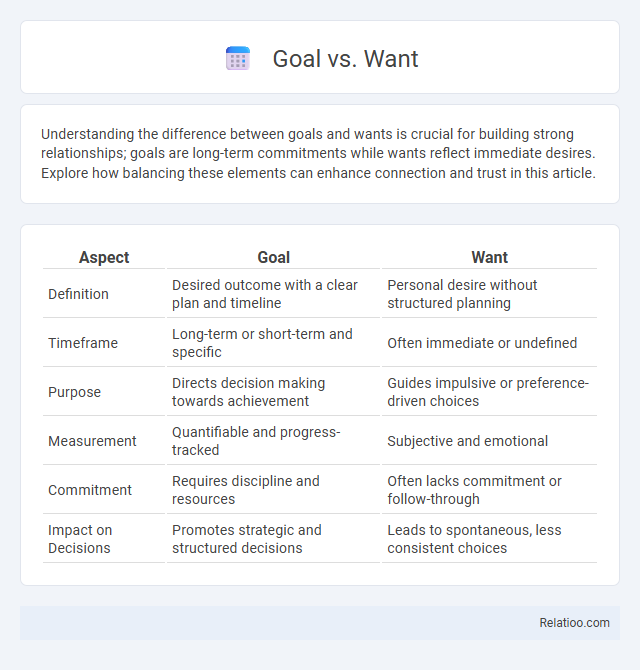Understanding the difference between goals and wants is crucial for building strong relationships; goals are long-term commitments while wants reflect immediate desires. Explore how balancing these elements can enhance connection and trust in this article.
Table of Comparison
| Aspect | Goal | Want |
|---|---|---|
| Definition | Desired outcome with a clear plan and timeline | Personal desire without structured planning |
| Timeframe | Long-term or short-term and specific | Often immediate or undefined |
| Purpose | Directs decision making towards achievement | Guides impulsive or preference-driven choices |
| Measurement | Quantifiable and progress-tracked | Subjective and emotional |
| Commitment | Requires discipline and resources | Often lacks commitment or follow-through |
| Impact on Decisions | Promotes strategic and structured decisions | Leads to spontaneous, less consistent choices |
Understanding the Difference Between Goals and Wants
Understanding the difference between goals and wants is crucial for effective personal development. Goals are specific, measurable, and time-bound objectives that you strive to achieve, while wants are desires or wishes that may not have a clear plan or deadline. Recognizing this distinction helps you prioritize your efforts and create actionable steps to turn your aspirations into reality.
Defining Goals: Purpose and Characteristics
Goals represent clear, specific outcomes individuals strive to achieve, embodying purpose and measurable characteristics that differentiate them from general wants or desires. Unlike wants, which are often broad and abstract, goals are concrete, time-bound, and actionable, providing direction and motivation. Defining goals involves setting precise targets with defined criteria, enabling progress tracking and strategic planning.
What Are Wants? Exploring Desires and Impulses
Wants are immediate desires driven by impulses, reflecting short-term cravings rather than long-term planning. They often arise from emotional or sensory triggers, differentiating them from structured goals that require commitment and strategic effort. Understanding wants involves recognizing their transient nature and their influence on behavior without the necessity of actionable steps.
The Psychology Behind Goals and Wants
Goals are specific, measurable outcomes that individuals consciously strive to achieve, driven by intrinsic motivation and a clear sense of purpose. Wants are more fluid desires influenced by external factors, often linked to immediate gratification or social validation without structured planning. The psychology behind goals involves self-regulation and future-oriented thinking, while wants reflect present-focused impulses shaped by emotional states and environmental cues.
Why Goals Matter More Than Wants
Goals provide a clear roadmap for achieving specific outcomes, while wants often represent fleeting desires without a structured plan. Your focus on goals matters more than mere wants because goals are measurable, time-bound, and motivate sustained effort toward long-term success. Establishing goals ensures commitment and accountability, transforming your ambitions into actionable results.
How to Turn Wants Into Achievable Goals
Transforming wants into achievable goals requires clear definition and actionable planning. Identify specific, measurable objectives linked to your desires, set deadlines, and create step-by-step milestones to track progress. Prioritizing goals over vague wants increases motivation and the likelihood of successful outcomes.
Examples: Goals vs Wants in Everyday Life
Goals represent specific achievements like completing a marathon or saving $10,000 for a house down payment, while wants often include desires such as buying the latest smartphone or dining at an expensive restaurant. For example, a goal may be studying diligently to earn a promotion, whereas a want could be purchasing a luxury car for personal enjoyment. Distinguishing between goals and wants helps prioritize actions that contribute to long-term success rather than immediate gratification.
Benefits of Focusing on Goals Over Wants
Focusing on goals rather than wants drives sustained progress by providing clear direction and measurable outcomes, which enhances motivation and accountability. Goals, often specific and time-bound, enable better resource allocation and strategic planning compared to fleeting desires or impulsive wants. Prioritizing goals fosters resilience and long-term success, as it aligns actions with personal values and measurable achievements rather than temporary satisfaction.
Common Mistakes: Confusing Wants for Goals
Many people mistakenly treat wants as goals, leading to a lack of clear direction and ineffective planning. Goals require specific, measurable, and time-bound criteria, whereas wants often reflect desires without actionable steps. Clarifying this distinction improves focus and increases the likelihood of achieving meaningful outcomes.
Strategies to Align Wants with Your Long-Term Goals
Aligning your wants with long-term goals requires clear prioritization and consistent evaluation of desires against your overarching objectives. Develop strategies such as setting specific, measurable milestones, practicing mindful decision-making, and regularly reviewing progress to ensure your wants support rather than distract from goal achievement. This approach keeps your personal ambitions focused and enhances your ability to turn aspirations into enduring success.

Infographic: Goal vs Want
 relatioo.com
relatioo.com